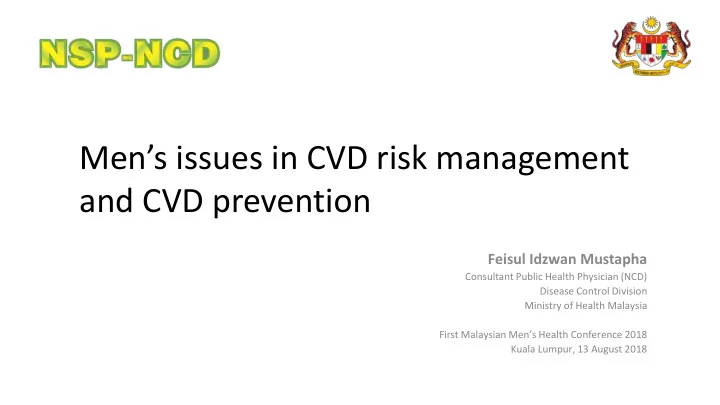

Men’s issues in CVD risk management and CVD prevention Feisul Idzwan Mustapha Consultant Public Health Physician (NCD) Disease Control Division Ministry of Health Malaysia First Malaysian Men’s Health Conference 2018 Kuala Lumpur, 13 August 2018
There are Four Major Groups of Non-Communicable Diseases (NCDs); Four major lifestyles related risk factors Modifiable causative risk factors Physical Harmful use of Tobacco use Unhealthy diets inactivity alcohol ✓ ✓ ✓ ✓ Heart disease and stroke Noncommunicable diseases ✓ ✓ ✓ ✓ Diabetes ✓ ✓ ✓ ✓ Cancers ✓ Chronic lung disease 2
Presentation outline • Men’s Health Status – Mortality Rates and Trends – NCDs in Men and Risk Factors • Characteristics of Men – Health Seeking Behaviour – Health Literacy – Risk Taking and Masculinity • Role of Sex and Gender in NCDs • Benefits of Improved Men’s Health • Mainstreaming Gender in NCD Policies 3
Male mortality • Men are known to have a shorter life expectancy and higher mortality compared to women. • Mortality rate in men versus women – Asia – Malaysia 4
5
Premature mortality due to NCDs, Malaysia 6
Deaths attributable to risk factors, Malaysia Poor Water & Sanitation 0.1% 0.1% Underweight 0.2% 0.2% Alcohol 2.3% 0.3% Physical Inactivity 5.0% 7.1% High BMI 7.0% 8.2% High Cholesterol 7.3% 8.1% Diabetes Mellitus 8.5% 9.1% Tobacco 15.7% 1.2% High BP 19.4% 22.8% 25% 20% 15% 10% 5% 0% 5% 10% 15% 20% 25% Male Female 7 Burden of Disease Study Malaysia 2008, slide courtesy of Dr Mohd. Azahadi Omar, Institute for Public Health
DALYs attributable to risk factors, Malaysia 0.1 % 0.1% Poor Water & Sanitation Underweight 0.7 % 0.7 % Physical Inactivity 3.1 % 4.3 % Alcohol 4.3 % 0.9 % High Cholesterol 5.2 % 5.1 % High BMI 8.3 % 12.1 % 9.0 % Diabetes Mellitus 11.4 % Tobacco 10.7 % 0.7 % High BP 10.8 % 10.8 % 15.0 % 10.0 % 5.0 % 0.0 % 5.0 % 10.0 % 15.0 % Male Female 8 Burden of Disease Study Malaysia 2008, slide courtesy of Dr Mohd. Azahadi Omar, Institute for Public Health
Prevalence of Selected NCD Risk Factors Based on NHMS 2015, amongst the Malaysian adult population (≥18 years ): • 63.6% of men, and 64.5% of women are either overweight or obese • 43% of men smoke; 59% of men ages 21-30 smoke • 43.5% of men, and 52.2% of women have hypercholesterolemia • 30.8% of men, and 29.7% of women have hypertension • 16.7% of men, and 18.3% of women have diabetes mellitus 9
Health seeking behaviour and utilisation of health services • Under-utilisation of primary care services • Structural barriers – Primary care services available when men at work • Health awareness fail to engage men 10
Health literacy Health literacy is dependent on individual and systemic factors: – Communication skills of lay persons and professionals – Lay and professional knowledge of health topics – Culture – Demands of the healthcare and public health systems – Demands of the situation/context Men has less knowledgeable than women about specific diseases, risk factors and health in general 11
Risk taking and masculinity • Men’s risk taking behaviours and under utilisation of health services largely linked to male role norms. – e.g. use of tobacco linked to their perception that a real man should be daring, courageous, confident and able to demonstrate manliness • Heavy drinking • Promoting positive models of manhood – e.g. caring and involved fatherhood can improve men’s health seeking behaviour 12
Sex and gender in NCDs • Tackling men’s health is NOT more important than addressing women’s health; – Not binary choice or zero-sum game – In certain areas, women’s outcome worse than men – In some countries, gender power dynamics mean women lack autonomy in health 13
Benefits of improved Men’s health • Lower male premature mortality and morbidity rates – Also benefit women and families who depend on men’s incomes • Lower levels of alcohol consumption – Help reduce inter-personal violence • Reduce economic costs of lost productivity and health treatments 14
National Strategic Plan for Non-Communicable Diseases (NSP-NCD) 2016-2025 • Approved by MOH on 10 April 2017 – Continuation from NSP-NCD 2010-2014 • In- line with Malaysia’s commitment at the global level for NCD prevention and control – Including Sustainable Development Goals (SDGs) • Governance: Cabinet Committee for a Health Promoting Environment – Chaired by Deputy Prime Minister – Membership: 12 ministers 15
Implementation of NSP-NCD 2016-2025 1. National Plan of Action for Nutrition of Malaysia III 2016-2025 2. National Strategic Plan for Tobacco Control 2015-2020 3. Policy Options to Combat Obesity in Malaysia 4. Salt Reduction Strategy for Malaysia 2015-2020 5. National Strategic Plan for Active Living 2016-2025 Malaysia’s Alcohol Action Plan 2013 -2020 6. 7. National Strategic Plan for Cancer Control Program 2016-2020 8. Enhanced Primary Healthcare (EnPHC) initiative 9. Komuniti Sihat, Pembina Negara (KOSPEN) initiative 16
Steps in mainstreaming gender in NCD policies • Disaggregation by sex/gender in NCDs research, intervention, monitoring and evaluation • Shift mindsets to appreciate that gender norms affect everyone’s health • Gender in global health is a political issue, in that specific interests perpetuate gender norms and thus, specific interests are needed to address these interests Hawkes, S., & Buse, K. (2013). Gender and global health: evidence, policy, and inconvenient truths. The Lancet, 381(9879), 1783-1787 17
18
Next steps for us… • Life-course approach • Gender responsiveness • Address gender and other social determinants 19
Main references • Gender and Global Health: Evidence, Policy and Inconvenient Truths 2013 • Men’s Health: Time for a New Approach to Policy and Practise 2017 • Gender, Health and Sustainable Development Goals 2015 20
Thank you dr.feisul@moh.gov.my 21
Recommend
More recommend